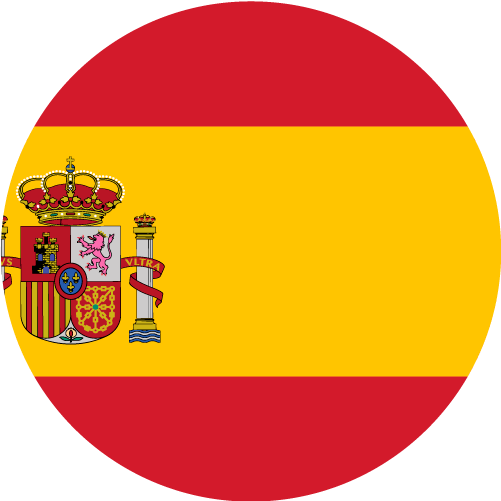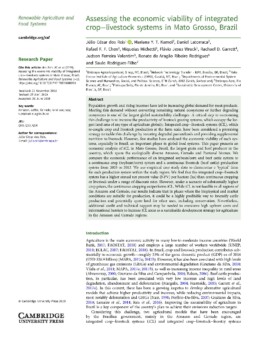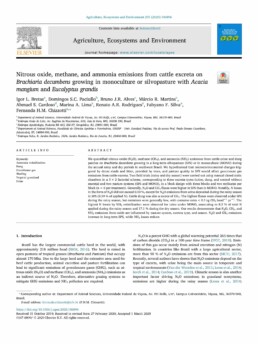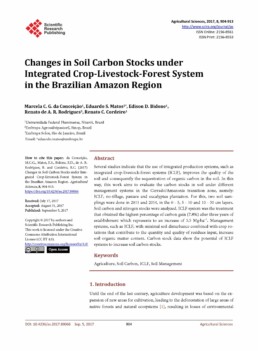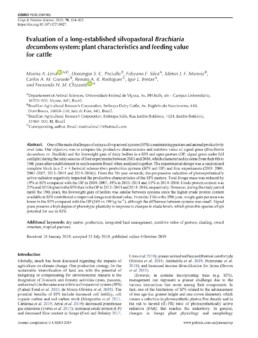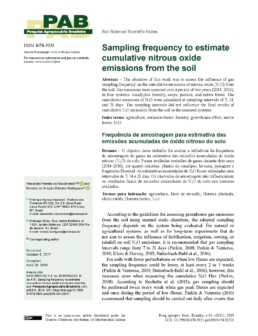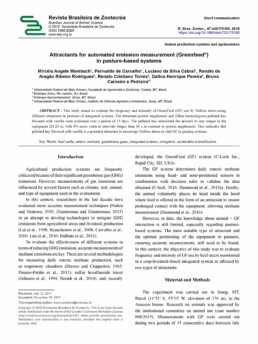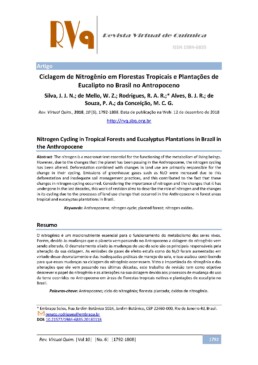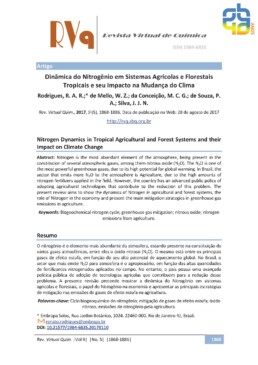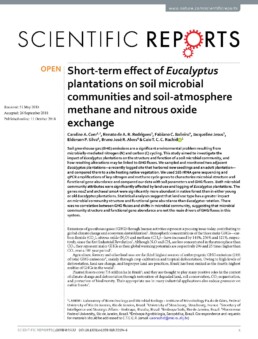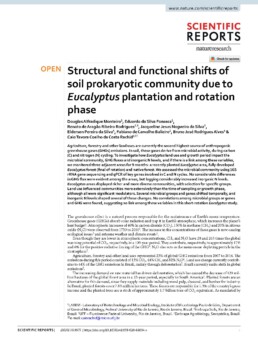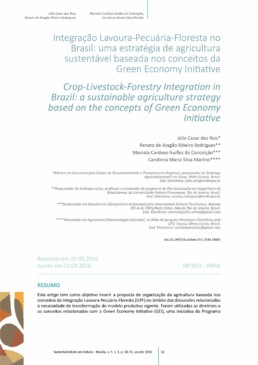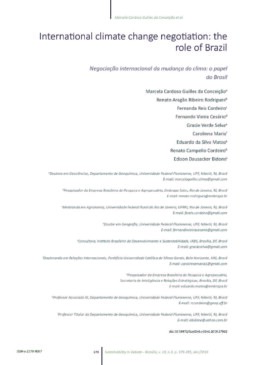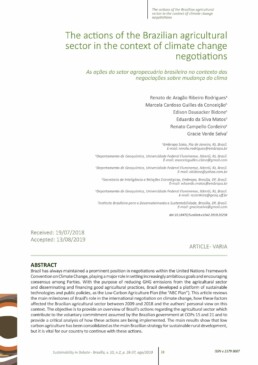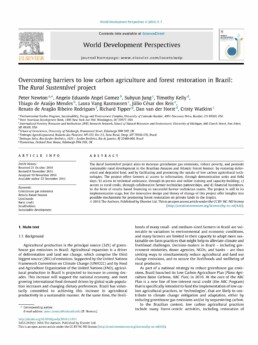OBJECTIVE
The project objective is to help farmers within the Amazonia and Atlantic Forest Biomes improve the management of their land and forests, thus encouraging sustainable rural development, poverty reduction, biodiversity conservation and climate protection.
The program aims to promote the implementation of a large-scale project to enhance the development of the Low-Carbon Agriculture (ABC) Programme and encourage the implementation of agriculture technologies within rural properties under the Project.
INSTITUTIONAL PARTNERS
This Technical Cooperation Programme is executed by the Inter-American Development Bank (IDB). It has been funded by the International Climate Fund (ICF) of the Department for Environmental, Food and Rural Affairs (DEFRA). The Ministry of Agriculture, Livestock and Food Supply (MAPA) in Brazil is the beneficiary of the contribution and it has appointed the Social Mobility, Rural Producer and Cooperatives Secretary to act as the technical and institutional coordinator within the MAPA.
The Brazilian Institute of Development and Sustainability (IABS) was selected, under an IDB competitive bidding process (SPD 16-072), to provide executing services and to operationalize the administrative and logistical activities of the Project. In April 2017, the IDB and IABS signed the contract C0049-17 to officially start activities.
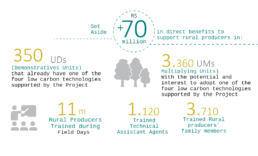
COMPONENTS
Component 1
Focuses on offering access to technical assistance with submitting technical proposals (PTECs) and implementing approved PTECs activities by facilitating farmer-technician collaborative partnerships. It also offers financial incentives in the form of cash payments to small and medium rural producers to adopt low carbon agricultural technologies that promote sustainable rural production and environmental regularization measures.
Component 2
Is designed to facilitate training activities that strengthen the capabilities of those candidates from the Rural Extension Institutions (ATERs) to become project certified technicians (ATECs). This component supports training programs for rural producers by organizing meetings and field days at Demonstration Units selected by the Project.
Component 3
Ensures proper project execution, monitoring and evaluation of all Programme’s activities.
BENEFICIARIES
Small and medium rural producers and project certified technicians (ATECs).
LOCAL TEAM
The project execution and implementation team is composed of professionals from the IDB and IABS. To support the execution and operationalization of administrative and logistical activities, Rural Sustentável has local teams in each participating state. The teams are composed of field supervisors and communication advisors.
FIELD SUPERVISORS
Field supervisors are IABS professionals responsible for supporting and supervising the field days execution and disseminating information about the Project scope within the participating municipalities.
COMMUNICATION LOCAL ADVISORS
Communication local advisors are communication professionals from the IABS team. They are responsible for supporting the deployment, direction and registration of the project actions within the states.
PROJECT ACTIONS
– Promote technical assistance trainings on the low carbon technologies supported by the Project.
– Promote training programs among rural producers by organizing discussions and field days at the Demonstration Units selected by the Project.
– Select and implement Demonstration Units in all the 70 participating municipalities.
– Facilitate rural producers in accessing traditional rural credit lines by providing technical assistance through in-person and online training and financial incentives to implement the technologies in selected Multiplying Units.
PROJECT MAIN OUTPUTS
Demonstrations Units (DUs)
Demonstration units (DUs) are areas of rural production with at least one of the low carbon technologies supported by the Project. These DUs have the purpose of showcasing the technologies and lessons learned to rural producers during the Field day events.
Multiplying Units (MUs)
Multiplying units are areas of rural production where at least one of the low carbon technologies supported by the Project will be implemented. Under this scheme, the Project will provide technical assistance to rural producers to plan, implement and guide the MU. The MUs with proved and measured achievements based on their Technical Proposals will receive the conditional cash payments.
FIELD DAYS
Field days are events taking place in any of the selected Demonstration Units (DUs) targeting rural producers, technicians and other key participants. It is also part of the strategy to disseminate the Project. Field days are used to:
1 – Showcase successful experiences and train participants on low carbon technologies implementation within rural sites.
2 – Encourage the dissemination of sustainable practices for production and conservation.
Bahia
Minas Gerais
Paraná
Rio Grande do Sul
Mato Grosso
Pará
Rondônia
TRAININGS
Trainings aim to strengthen the knowledge of ATECs and enhance the management of rural properties to increase production and income. The following in-person training sessions have been planned: a) low carbon technologies supported by the Project; b) sustainable rural land management and; c) georeferencing. In addition, there are four free on-line courses open to ATECs and the general public: 1) Introduction to the Project Rural Sustentável; 2) Rural Land Management; 3) Productive Arrangements and; 4) Diagnosis using ArcGis tool..
RURAL PRODUCERS
Trainings aim to strengthen the knowledge of ATECs and enhance the management of rural properties to increase production and income. The following in-person training sessions have been planned: a) low carbon technologies supported by the Project; b) sustainable rural land management and; c) georeferencing. In addition, there are four free on-line courses open to ATECs and the general public: 1) Introduction to the Project Rural Sustentável; 2) Rural Land Management; 3) Productive Arrangements and; 4) Diagnosis using ArcGis tool.
– Submit documentation to prove identity according to the Request for Proposal (RFP) of each Call.
– Have a valid and regularized Individual Taxpayer Registry Identification (Cadastro de Pessoas Físicas – CPF).
– Submit documentation to prove land ownership and legalization according to the Request for Proposal (RFP) of each Call.
– Have the property within the Biomes and Municipalities participating in the Project.
– Establish a Technical Cooperation Agreement with a project certified technical assistant and work together on writing a funding proposal. approved, comply with the implementation of the proposed activities.
– Be within the following classification of rural producers:

*The size of a fiscal module (FM) varies according to each municipality. Click the link to check the size of the FM within your municipality.
If you are a rural producer interested in the Project, please reach a Certified Technical Assistant (ATEC) in your municipality. Check the approved ATER institutions in the following link [link] and access the Project’s benefits.
TECHNICAL ASSISTANCE AND RURAL EXTENSION INSTITUTION (ATER) AND TECHNICAL ASSISTANCE AGENT (ATEC)
The Project foresees training activities and financial incentives for the ATER institutions and their ATECs. The available benefits and resources are:
a) Training on Low Carbon Agricultural Technologies; Georeferencing; Sustainable Rural Land Management; and About the Project “Rural Sustentável”.
b) Field days in the selected Demonstration Units.
c) Public Calls for Proposals to select Demonstration and Multiplying Units.
TO BE PART OF THE PROJECT, THE ATER INSTITUTIONS MUST:
1) Register on the Project website and attach the mandatory documents.
2) Accept the Project terms of conditions and consent.
3) Nominate the personnel that might act on behalf of the institution as an ATEC for the Project.
TO BE PART OF THE PROJECT, THE ATER INSTITUTIONS MUST:
1) Have received formal higher education in agricultural sciences. Keep a valid professional membership issued by the corresponding official councils.
2) Complete and submit registration on the Project website and attach the mandatory documents.
3) Sign a Technical Cooperation Agreement with an eligible rural producer to work together to submit a funding proposal for the project and, if approved, guide the implementation of the proposed activities.
4) Provide technical assistance to the rural producers and support the work conducted in the selected UDs or UMs. The ATEC must ensure that activities are implemented successfully and in accordance with the proposed plan regarding the low carbon technologies.
If you are an eligible institution and want to contribute to improving production and sustainability in the rural areas, register on our website and nominate your ATECs.
APPROVED INSTITUTIONS
A
ACCOMIG
ADEOP
AGRIFLORESTAL
AGRO SOCIAL ZAMBEZE
AGROATINS CARAJÁS
AGROCRED ENGENHARIA & CONSULTORIA
AGROLÓGICA
AGROPECUÁRIA SEMEAR
AGROSOLLO- PLANEJAMENTO TÉCNICO AGROPECUÁRIO LTDA
AGROTOP RURAL
ALMEIDA ROCHA COMÉRCIO E SERVIÇOS ADMINISTRATIVOS
ALVORADA DO NORTE CONSULTORIA E ASSISTÊNCIA VETERINARIA
AM ASSESSORIA AMBIENTAL LTDA
AMBIOVERDE
ASSOCIAÇÃO CEIBA
ASSOCIAÇÃO CULTURAL E AMBIENTALISTA DOS ÍNDIOS TUPINAMBÁ DE OLIVENÇA
ASSOCIAÇÃO DE PEQUENOS PRODUTORES RURAIS DE AGROVILA 05
ASSOCIAÇÃO RIOGRANDENSE DE EMPREENDIMENTOS DE ASSISTÊNCIA TÉCNICA E EXTENSÃO RURAL
ASSOCICAO DOS AGRICULTORES FAMILIARES E REMANESCENTES DE QUILOMBOLAS DA REGIAO DOS MACACOS DO MUNICI
ATER ITAPEJARA
ATLAS CONSULTORIA, PROJETOS E SOLUÇÕES AMBIENTAIS
B
BCA CONSULTORIA AGROPECUÁRIA LTDA
BERTUZZI SERVIÇOS DE AGRONOMIA
BIORGÂNICA
C
CALL CONSULTORIA AGROPECUARIA LTDA
CALVET- CONSULTORIA E ASSESSORIA VETERINÁRIA
CAPÃO ALTO CONSULTORIA RURAL LTDA.
CEDRO ASSESSORIA E PLANEJAMENTO FLORESTAL
CENTRO DE TECNOLOGIAS ALTERNATIVAS POPULARES
CENTROESTE PLANEJAMENTO E CONSULTORIA AGRÍCOLA LTDA
CEPLAC
CIAAT
CLUBE AMIGOS DA TERRA – CAT SORRISO
COAFA
CONEAGRO – CONSULTORIA E ELABORAÇÃO DE PROJETOS AGROPECUÁRIOS
CONPLATEC TERRA SANTA
CONSTAGRO ENGENHARIA
CONSULTORIA RAÍZES
CONTEXTO RURAL
COOAFA
COOPAFBASUL
COOPALM
COOPATAN
COOPAX
COOPERATIVA DE TRABALHO AGROAMBIENTAL DE RONDÔNIA – COOTRARON
COOPERATIVA MISTA OURO VERDE LTDA
COOPERBIO
COOPERIGUAÇU
COOPERQUER – COOPERATIVA AGROPECUÁRIA DE QUERÊNCIA
COORDENADA RURAL AGRO SOCIOAMBIENTAL
COOTRASBE
COSTA CONSULTORIA
CULTIVARE ENGENHARIA E SOLUÇÕES AGROPECUÁRIAS
D
DEFENDER
DINIZ CONSULTORIA AGRÍCOLA
E
ECO TIME
ECOPORÉ
EMATER-MG
EMPAER MT
EMPRESA DE ASSISTÊNCIA TÉCNICA E EXTENSÃO RURAL DO ESTADO DO PARÁ – EMATER PARÁ
ENPLATÉC CONSULTORIA E PLANEJAMENTOS
ENTIDADE AUTÁRQUICA DE ASSISTÊNCIA TÉCNICA E EXTENSÃO RURAL DO ESTADO DE RONDÔNIA-EMATER
EVOLUÇÃO – ASSESSORIA TÉCNICA AGROFLORESTAL
EXTENSÃO CARAJÁS ASSESSORIA E PLANEJAMENTO AGROPECUÁRIO LTDA ME
G
GEOVIDA CONSULTORIA AMBIENTAL LTDA – ME
GIGA CONSULTORIA
H
HEBRON FLORESTAL
I
IBIO
IBS
INAES
INSTITUTO BRASIL DE ESTUDOS, PESQUISAS E GESTÃO ESTRATÉGICA DE COMPETÊNCIAS
INSTITUTO BRASILEIRO DO AGRONEGÓCIO – IBA
INSTITUTO EMATER
INSTITUTO FLORAVIDA
INSTITUTO PAULINE REICHSTUL
J
JB EMPREENDIMENTOS
JEQUIAGRO CONSULTORIA AMBIENTAL
JMEDEIROS CONSULTORIA
JVS PROJETOS E CONSULTORIA
L
LN ASSISTÊNCIA TÉCNICA E EXTENSÃO RURAL
M
MANI ROCHA PROJETOS & CONSULTORIA
N
NEO SOLUÇÕES AMBIENTAIS LTDA-ME
O
OCT
OURO VERDE ENGENHARIA
P
PECANHA E SANTOS SOLUCOES AGROPECUARIAS LTDA – ME
PLANIGUAÇU
PLANTPLAN
PLANTSUL
PREFEITURA
PREFEITURA MUNICIPAL
PREFEITURA MUNICIPAL DE ALTA FLORESTA
PREFEITURA MUNICIPAL DE BRASNORTE-MT
PREFEITURA MUNICIPAL DE BURITIS
PREFEITURA MUNICIPAL DE MACHADINHO
PREFEITURA MUNICIPAL DE MARAÚ
PREFEITURA MUNICIPAL DE NOVA LONDRINA
PREFEITURA MUNICIPAL DE PARECIS/RO
PREFEITURA MUNICIPAL DE PRESIDENTE TANCREDO NEVES
PREFEITURA MUNICIPAL DE SETUBINHA
PROAGRI – EMPRESA DE DESENVOLVIMENTO DE PROJETOS AGRICOLAS LTDA – EPP
PROATEC PROJETOS E ASSESSORIA TÉCNICA RURAL LTDA ME
PROGEO
PROTEGE AGRO. CONSUL AGRICOLA E AMBIENTAL
R
RASTREAR PROJETOS AGROPECUÁRIOS
RR PLANEJAR, CONSULTORIA E TREINAMENTOS
RS CONSULTORIA AMBIENTAL
RURALPLAN ASSESSORIA CONSULTORIA E PLANEJAMENTO RURAL
S
SECRETARIA DE DESENVOLVIMENTO ECONÔMICO AGRICULTURA E ASSUNTOS FUNDIÁRIOS
SECRETARIA MUNICIPAL DE AGRICULTURA
SERVIÇO NACIONAL DE APRENDIZAGEM RURAL-SENAR
SIA – SERVIÇO DE INTELIGÊNCIA EM AGRONEGÓCIOS
SILVATOP ENGENHARIA E AGRIMENSURA LTDA.
SS SOLUÇÕES
SUDTEC PLANEJAMENTO E ASSISTÊNCIA TÉCNICA
T
TERRA FÉRTIL
TOPLAGRO
V
VIAVERDE CONSULTORIA
VISÃO RURAL PROJETOS E ASSESSORIA
W
W B CONSULTORIA EMPRESARIAL
TECHNOLOGIES INTEGRATED CROP-LIVESTOCK-FOREST SYSTEMS - ICLFS, INCLUDING AGROFORESTRY SYSTEMS.
According to EMBRAPA, the Integrated Crop-Livestock-Forest (ICLF) is described as a system integrating the crop, livestock and forest components, in rotation, combination or succession, in the same area. The overarching objective of ICLF is to change the system of land use by integrating productive system components that will create synergies between crop and pasture and achieve higher levels of product quality, environmental quality and price competitiveness.
The agroforestry systems are production systems integrating the crop and forest components through the combination of tree species and agricultural (annual or perennial) crops. These systems are a feasible production alternative to recover altered or degraded areas. The integration of trees with pastures and/or crops allows the soil to be economically exploited all year round, favoring the diversification of products.
RESTORATION OF DEGRADED LANDS WITH PASTURE (RDL-P) AND RESTORATION OF DEGRADED LANDS WITH FORESTS (RDA-F)
The restoration of degraded lands is a technique that seeks to reverse a site known as having a degraded condition to one with a nondegraded condition. This technology could contribute to socio-economic development and environmental protection providing higher yields and economic returns, less new cropland and deforestation, and provide societal benefits via production stability. RDL enables restoration of an area’s physical integrity, chemistry and biology (structure) while recovering the production capability (function) either of raw materials and food or ecological and ecosystem-based functions.
Restoration of Degraded Lands with Pasture (RDL-P) enables restoration of an area’s physical integrity, chemistry and biology (structure) while recovering the production capability (function) of either raw materials or food.
Restoration of Degraded Lands with Forests (RDL-F) enables restoration of an area’s physical integrity, chemistry and biology (structure) while recovering the production capability (function) either ecological or ecosystem-based, taking into consideration the legal aspects regarding the restoration of the Areas of Permanent Protection (APPs) and the Legal Reserves (LRs).
PLANTING COMMERCIAL FORESTS
The planting of tree species for commercial purposes is important, not only from a production point of view, but from an environmental conservation point of view. The planting of commercial forests reduces the pressure on native forests, supplies raw materials for both industrial and non-industrial use, and contributes to supply ecosystem and social services. This technology is not restricted to exotic species for timber but also includes a wide variety of tree species in pure forest plantations, that is, a system not integrating agricultural and pasture components.
SUSTAINABLE MANAGEMENT OF NATIVE FORESTS
According to the Public Forest Management Law (No 11.284/2006), sustainable forest management is referred to as the “effective exploitation of the forest to obtain economical, societal and environmental benefits by strictly following the sustainability principles and mechanisms for the intervened ecosystem. This approach must consider, accumulative or alternatively, the use of multiple timber tree species, multiple non-timber products and subproducts, in addition to other forestry goods and services.”
The agroforestry systems are production systems integrating the crop and forest components through the combination of tree species and agricultural (annual or perennial) crops. These systems are a feasible production alternative to recover altered or degraded areas. The integration of trees with pastures and/or crops allows the soil to be economically exploited all year round, favoring the diversification of products.


